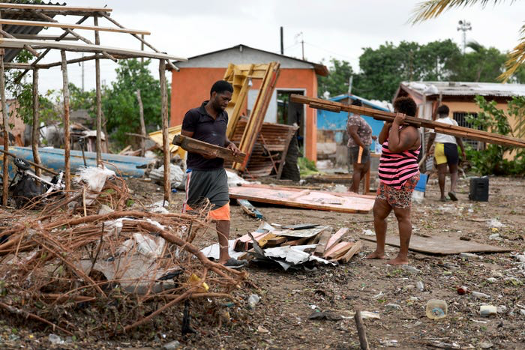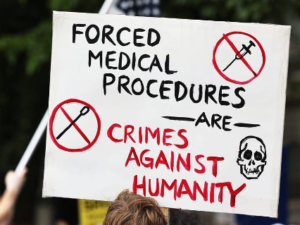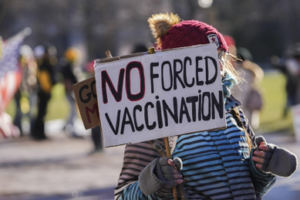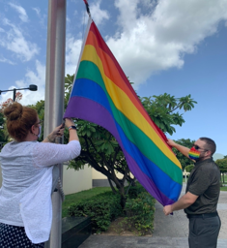Holness, Charles promote national ID in disaster zone
The recent announcement by Prime Minister Andrew Holness that the National Identification System (NIDS) would have assisted with the speedy distribution of disaster relief assistance to those devastated by the passage of hurricane Beryl, has fueled speculations that Jamaicans will be forced eventually to accept the ID in order to get government aid.
The government has maintained that the NIDS will be voluntary. This assurance was given after the initial Bill to enact the electronic system was struck down by the Constitutional Court in 2019 on the basis that it will breach citizens’ right to privacy as guaranteed by the nation’s Constitution.
“Now, there is confusion in the minds of many of our citizens that anonymity and privacy is the same thing. They’re not. If you want to get a benefit from the government, you cannot be anonymous. If you are anonymous, how can we account for you?” he asked after making a pitch for the NIDS during the official launch of the rebuild Jamaica initiative on August 5.
“If you don’t want the public to know that you got a benefit, then that can be private. And so the system that we are trying to build is one that will preserve your privacy, but enhance accountability and I hope that clarifies that in the minds of many suspicious or sceptical Jamaicans,” he asserted.
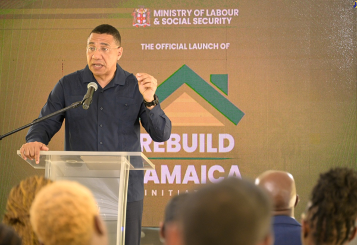
Under the rebuild Jamaica initiative, cash grant is being given to Jamaicans who suffered damage during the passage of hurricane Beryl on July 3. A total of $1 billion has been set aside for housing support to help those whose homes were damaged or destroyed. Up to J$400,000 will be given to Jamaicans whose homes were destroyed, while up to J$150,000 will be given to those with severely damaged properties. Jamaicans whose homes received minor damage will receive J$50,000.
The Constitutional Court had determined that coercing all citizens to obtain a national identification number or card by depriving them of public services if they do not, infringed their rights to privacy and liberty, and is not justified in a free and democratic society and so could not be allowed to stand. The Court also found that it also infringes the right to equality before the law. These were among several reasons the NIDS was deemed unconstitutional.
Pastor Joseph Buckland is not surprised that the government has found a way to promote the NIDS during such a crucial time when persons are desperate for help.
“That has been the theme for a while. That if you have the National Identification Electronic System at work, that they could fast-track help to the different institutions and people. I think what the government is doing is capitalising on disasters in order to give people an incentive to sign up for the national identification. So they are definitely using it to their advantage,” he said.
Minister of Labour and Social Security, Pearnel Charles Jnr. also promoted the NIDS during the event.
“We have to as a country, come to a place where we have our data in a structured way, so we don’t have to be running around to identify persons. Believe me, the Ministry of Labour and Social Security is a testament through this event to the importance of this country understanding that we must prepare ourselves by organising ourselves, we must be able to identify Jamaicans where you are, what are your circumstances. Whatever the adjustments that are needed Prime Minister, I am now perhaps your number one support for that National Identification System to come into place,” he said.
Buckland, who is also a lecturer, has several concerns about NIDS, based on his review of the new regulations that were made public last year. He noted that while the legislation states that the NIDS will be voluntary, it may in practice become compulsory.
“How voluntary is it going to be if the banks make the national identification card a requirement for doing business with them? How voluntary is it going to be if private sector businesses make the national identification card a requirement for transacting business with them? How voluntary is it going to be if educational institutions make the national identification card a requirement for registering students?” he asked during an interview with the Freedom Come Rain last year.
The fact that the government is now positioning it as a requirement to get government aid following a national disaster, has amplified his concerns. Several countries around the world have implemented an electronic national identification system or are in the process of putting one in place. Buckland is of the belief that the NIDS will become a part of an International Identification System. The initial design and development of NIDS was financed with a US$68 million loan from the Inter-American Development Bank.
“Jamaica is not doing this by itself. The United Nations and International financial institutions have been pushing for a worldwide electronic ID, which they thought would have been a reality in 2020,” he noted as he pointed to the fact that this will facilitate the one world government which the Bible spoke about.
Incidentally, UN officials were also present during the launch of the rebuild Jamaica initiative where the NIDS was promoted. UN resident co-ordinator in Jamaica, Dennis Zulu, brought remarks on behalf of United Nations Secretary-General António Guterres. He spoke about the help being offered by several UN agencies locally to assist Jamaicans recover from the impact of Beryl. Help is being provided by the United Nations Emergency Task Team, the United Nations World Food Programme, the United Nations Children’s Fund (UNICEF), the International Organization for Migration (IOM) , the United Nations Development Programme (UNDP), UN Women, PAHO-WHO, UNESCO, FAO and UNFPA.

“The target is to provide cash transfers to assist some 18,000 individuals or 6,000 households in the most affected southern and central parishes,” Zulu told those in attendance.
“Cash distribution is expected to commence in the coming weeks, funded by a multi-donor pool including contributions from the United States, Canada, The UK, and the Caribbean Catastrophe Risk Insurance Facility of up to $3 million USD. This is in addition to the funds being made available through the United Nations Central Emergency Response Fund,” Zulu said.
Holness noted that the cash grants to be given by the UN will likely be conditional. “The UN through the UN system, they will be giving cash grants as well. I’m not aware of what the magnitude of those will be but I’m certain that persons who are beneficiaries for the rebuild programme will also qualify and our good friends from GEM, (Global Empowerment Mission), will also be assisting not with cash I gather, but with reconstruction materials and so forth. So it’s clear that the benefits that will flow to persons who have been affected- and from the World Food Programme as well, will be significant,” he said.

